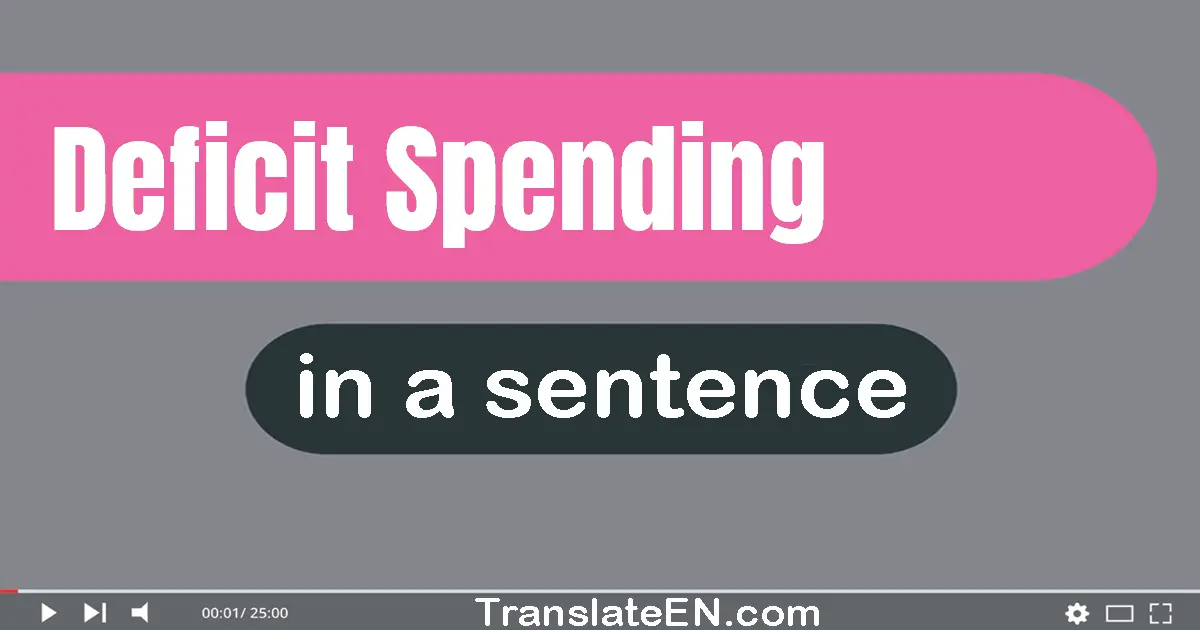Deficit Spending in a sentence
Synonym: borrowing. Antonym: balanced budget
Meaning: Deficit spending refers to the situation when a government's expenditures exceed its revenues.

(1) The national debt is a consequence of deficit spending.
(2) Deficit spending can be used to fund social welfare programs.
(3) Deficit spending can be a means to finance military expenditures.
(4) The government's deficit spending has increased the national debt.
(5) Deficit spending can be a temporary solution to economic downturns.
(6) Critics argue that excessive deficit spending can lead to inflation.
(7) Keynesianism advocates for deficit spending during economic downturns.
(8) Deficit spending is often used as a means to stimulate economic growth.
(9) The government's deficit spending has led to an increase in national debt.
(10) Deficit spending can be used to fund research and development initiatives.
Deficit Spending sentence
(11) The effects of deficit spending on inflation rates are a subject of debate.
(12) Deficit spending can be a necessary tool during times of economic recession.
(13) Some countries have implemented strict measures to control deficit spending.
(14) Deficit spending can be a tool for governments to address income inequality.
(15) The government's deficit spending has funded various infrastructure projects.
(16) Deficit spending can lead to a decrease in the value of a country's currency.
(17) The consequences of deficit spending can be felt in the form of higher taxes.
(18) Some countries have implemented austerity measures to reduce deficit spending.
(19) Deficit spending can have both short-term benefits and long-term consequences.
(20) Keynesian policies often involve deficit spending to stimulate economic growth.
Deficit Spending make sentence
(21) Deficit spending can be a controversial topic among politicians and economists.
(22) Critics argue that deficit spending can lead to a burden on future generations.
(23) Deficit spending can be a tool for governments to address infrastructure needs.
(24) The country's deficit spending has resulted in a downgrade of its credit rating.
(25) Some economists believe that deficit spending can help reduce unemployment rates.
(26) The government's deficit spending has been a topic of discussion in economic forums.
(27) The government's deficit spending has been a topic of debate during election campaigns.
(28) The effects of deficit spending on the economy can vary depending on the circumstances.
(29) The consequences of long-term deficit spending can be detrimental to future generations.
(30) The consequences of deficit spending can be mitigated through effective fiscal policies.
Sentence of deficit spending
(31) Keynesian economics has been used to justify deficit spending during times of recession.
(32) The government's deficit spending has been a key factor in stimulating economic recovery.
(33) The government's deficit spending has been a source of concern for international investors.
(34) The government's deficit spending has been criticized for its lack of fiscal responsibility.
(35) Keynes was a proponent of deficit spending, arguing that it could stimulate economic growth.
(36) Some economists argue that deficit spending can lead to a crowding out of private investment.
(37) Keynesianism suggests that government should use deficit spending to boost economic activity.
Deficit Spending meaning
Deficit spending is a term that refers to a situation where a government or an organization spends more money than it earns. This can lead to a budget deficit, which means that the government or organization is spending more money than it is taking in. Deficit spending can be a controversial issue, as some people believe that it can lead to economic instability and inflation, while others argue that it can be a necessary tool for stimulating economic growth. If you are looking to use the term "deficit spending" in a sentence, there are a few tips that you should keep in mind. First, it is important to understand the context in which the term is being used. Are you discussing government spending, or are you talking about a business or organization that is experiencing financial difficulties? Understanding the context will help you to use the term correctly and effectively. Once you have a clear understanding of the context, you can begin to craft your sentence. Here are a few tips to help you use the term "deficit spending" effectively:
1. Be clear and concise: When using technical terms like "deficit spending," it is important to be clear and concise in your language. Avoid using overly complex sentences or jargon that may confuse your audience.
2. Use examples: To help illustrate your point, consider using examples of deficit spending in action.
For example, you might say, "The government's deficit spending on infrastructure projects has led to increased job growth in the construction industry."
3. Explain the consequences: Deficit spending can have both positive and negative consequences, depending on the situation. Be sure to explain the potential consequences of deficit spending in your sentence.
For example, you might say, "While deficit spending can be a useful tool for stimulating economic growth, it can also lead to inflation and increased national debt."
4. Use it in context:
Finally, be sure to use the term "deficit spending" in a way that makes sense within the context of your sentence. Avoid using it as a buzzword or catchphrase, and instead use it to convey a specific meaning or idea.
Overall, using the term "deficit spending" in a sentence requires a clear understanding of the context, as well as the ability to communicate complex ideas in a clear and concise manner. By following these tips, you can effectively use this term to convey your message and make a strong impression on your audience.
The word usage examples above have been gathered from various sources to reflect current and historical usage of the word Deficit Spending. They do not represent the opinions of TranslateEN.com.
